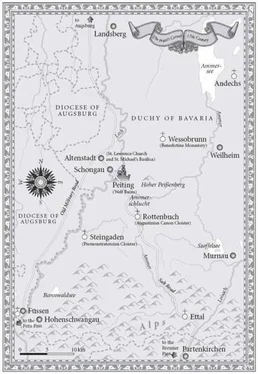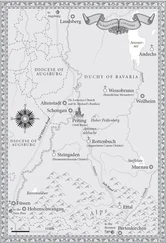Oliver Potzsch - The Hangman’s Daughter
Здесь есть возможность читать онлайн «Oliver Potzsch - The Hangman’s Daughter» весь текст электронной книги совершенно бесплатно (целиком полную версию без сокращений). В некоторых случаях можно слушать аудио, скачать через торрент в формате fb2 и присутствует краткое содержание. Жанр: Исторический детектив, на английском языке. Описание произведения, (предисловие) а так же отзывы посетителей доступны на портале библиотеки ЛибКат.
- Название:The Hangman’s Daughter
- Автор:
- Жанр:
- Год:неизвестен
- ISBN:нет данных
- Рейтинг книги:5 / 5. Голосов: 1
-
Избранное:Добавить в избранное
- Отзывы:
-
Ваша оценка:
- 100
- 1
- 2
- 3
- 4
- 5
The Hangman’s Daughter: краткое содержание, описание и аннотация
Предлагаем к чтению аннотацию, описание, краткое содержание или предисловие (зависит от того, что написал сам автор книги «The Hangman’s Daughter»). Если вы не нашли необходимую информацию о книге — напишите в комментариях, мы постараемся отыскать её.
The Hangman’s Daughter — читать онлайн бесплатно полную книгу (весь текст) целиком
Ниже представлен текст книги, разбитый по страницам. Система сохранения места последней прочитанной страницы, позволяет с удобством читать онлайн бесплатно книгу «The Hangman’s Daughter», без необходимости каждый раз заново искать на чём Вы остановились. Поставьте закладку, и сможете в любой момент перейти на страницу, на которой закончили чтение.
Интервал:
Закладка:
Meanwhile the raftsmen had steered toward the small pier at Kinsau. Tying their rafts together with great haste, they carefully ventured onto the treacherous surface of the logs closest to shore. Balancing on the slippery logs was a challenge even for these well-seasoned raftsmen. It was easy to lose one’s grip and be crushed to a pulp between the mighty beech and fir trunks. But the river was calm at this spot, and the trunks just bobbed up and down lazily.
Soon two men had reached the log with the boy. They prodded in the gaps with their poles in hopes of feeling a soft object. The logs underneath their feet began to wobble and roll. Again and again the men had to get their balance; their bare feet were slipping on the glistening bark.
“I’ve got him,” the larger and stronger of the two suddenly called out. With his powerful arms he pulled both boy and pole from the water and tossed them to the safety of the shore like a fish on a hook.
The raftsmen’s calls had made others aware of the emergency. Washerwomen from nearby Kinsau had come running to the river together with some wagon drivers. Now they were all standing on the rickety pier, gazing at the dripping clump at their feet.
The burly raftsman brushed the boy’s hair from his face, and a murmur went up from the crowd.
The boy’s face was blue and puffy, and the back of his head was crushed in as if he’d been struck hard with a heavy piece of wood. He was groaning. Blood was oozing through his wet coat, soaking the pier and dripping into the river. This boy had not just fallen into the water. Someone must have pushed him, and that someone had dealt him a fierce blow before that.
“Why, that’s Josef Grimmer’s boy, the son of the wagon driver in Schongau,” a man exclaimed. He was standing close by with his wagon and team of oxen. “I know the kid. He used to come to the landing site with his father. Quick, put him on the wagon. I’ll drive him to Schongau.”
“And somebody run and tell Grimmer that his boy is a-dying,” a washerwoman screamed. “Good Lord, and him having lost so many kids already!”
“It would be better to tell him right away,” the stocky raftsman grumbled. “This one’s not going to last long.” He slapped at some nosy boys standing around. “Run along. And fetch the barber or the physician.”
As the boys took off toward Schongau, the injured child’s groans grew fainter. He was shaking all over and seemed to be muttering something. A last prayer? He was about twelve years old and looked skinny and pale like most children his age. He must have eaten his last square meal weeks ago, and the watery barley broth and watery beer he had consumed over the past few days had made his cheeks hollow.
The boy’s right hand kept reaching out; his murmuring rose and ebbed like that of the Lech River beneath him. One of the raftsmen was on his knees, bending over the boy to hear what he was saying. But the murmuring gave way to gurgling, and bright red bubbles of blood and saliva trickled from the corners of his mouth.
They lifted the dying child onto the wagon, the driver cracked his whip, and they rumbled along Kinsau Road to Schongau. It was a journey of over two hours, and as they moved along, more and more people joined the silent procession. When they finally reached the landing site in the nearby town, more than two dozen onlookers followed the wagon: children, peasants, crying washerwomen. Dogs were yapping at the oxen, someone was mumbling a Hail Mary. The driver brought the vehicle to a halt at the jetty next to the storage shed. Two of the raftsmen lifted the boy off with great caution and gently placed him on some straw right by the shore of the rushing, gurgling Lech River that was flowing restlessly against the pillars.
The murmur of the crowd was suddenly interrupted by heavy footsteps on the pier. The boy’s father had been waiting off to one side, as if he were afraid of the last and final moment. Now deathly pale, he pushed his way through the throng.
Josef Grimmer had had eight children, and they had all died, one after the other, from the plague, diarrhea, fever, or simply because the good Lord had willed it. Hans was six years old when he fell into the Lech and drowned while playing. Marie, aged three, had been run over by drunken mercenaries on their horses in a narrow lane. His wife, together with their youngest child, had perished in childbirth. Little Peter was all that was left to old Grimmer. And as he saw him lying before him, he knew that the Lord would be taking this last son away from him as well. He fell on his knees and tenderly brushed the boy’s hair from his face. The child’s eyes were closed already, his chest was heaving convulsively, and a few moments later a spasm shook the little body. Then there was silence.
Josef Grimmer raised his head and screamed his grief across the Lech. His voice was high and shrill like a woman’s.
The scream reached the ears of Simon Fronwieser along with the sound of pounding downstairs at the front door. The physician’s house in the Hennengasse was just a stone’s throw from the river. Earlier, Simon had looked up from his books several times, distracted by the shouting of the raftsmen. Now that the screams were resounding through the narrow lanes of the town, he knew that something must have happened. The knock at the door grew more urgent. With a sigh he closed one of his hefty anatomy volumes. Like all the others, this book never went below the surface of the human body. The composition of the humors, bleeding as a universal remedy…Simon had read these same litanies far too many times, but they hadn’t really taught him anything about the inside of the body. And nothing would change today, as along with the knocking there was now shouting downstairs.
“Doctor, doctor! Quick, come! Grimmer’s boy is lying in his blood down at the landing site. It doesn’t look good!”
Simon threw on his black overcoat with the shiny copper buttons, ran his fingers through his black hair, and straightened his beard in front of the small mirror in his study. The shoulder-length mane and the Vandyke beard, which was again fashionable, made him appear older than his actual age of twenty-five. Some Schongauers regarded Simon as a dandy, but he didn’t care. He knew that girls saw the matter differently. The ladies of Schongau liked him on account of his dark and dreamy eyes, his well-shaped nose, and his slim figure. Moreover, he was well-groomed. He still had all his teeth; he took regular baths. And he had rose-scented perfume delivered specially from Augsburg, as expensive as his meager salary permitted it. It was only his height that bothered him. He didn’t stand taller than five feet, so he had to look up to most men, and to some women as well. But of course that could be remedied by high-heeled boots.
The knocking had now become a regular hammering. Simon hastened downstairs and flung the door open. Outside was one of the tanners who worked down at the river. His name, Simon remembered, was Gabriel. The physician knew him from an earlier occasion. He had put his arm in splints last year, when he had gotten himself into a drunken fight at St. Jude’s Fair. Simon put on an official mien. He knew what he owed to his profession.
“What’s the matter?”
The tanner regarded him suspiciously. “Where is your father? There’s been a bad accident down on the Lech.”
“My father is over at the infirmary. If it’s urgent, you’ll have to make do with me or with the barber.”
“The barber’s sick himself…”
Simon furrowed his brow. He still was regarded only as the physician’s son here in town, even though he had studied medicine in Ingolstadt and had been his father’s assistant in treating all possible ailments for almost seven years now. In recent years he’d even cured people on his own. His last case had been a dangerous fever. For days and days he’d applied cold ankle wraps and poultices to the cooper’s little daughter and administered a new medication to her: a powder of ground-up yellow bark that came from the West Indies and was known as “Jesuits’ Powder.” The fever had indeed subsided and the cooper had been grateful enough to pay two guilders more than his due. And still townspeople didn’t trust him.
Читать дальшеИнтервал:
Закладка:
Похожие книги на «The Hangman’s Daughter»
Представляем Вашему вниманию похожие книги на «The Hangman’s Daughter» списком для выбора. Мы отобрали схожую по названию и смыслу литературу в надежде предоставить читателям больше вариантов отыскать новые, интересные, ещё непрочитанные произведения.
Обсуждение, отзывы о книге «The Hangman’s Daughter» и просто собственные мнения читателей. Оставьте ваши комментарии, напишите, что Вы думаете о произведении, его смысле или главных героях. Укажите что конкретно понравилось, а что нет, и почему Вы так считаете.











